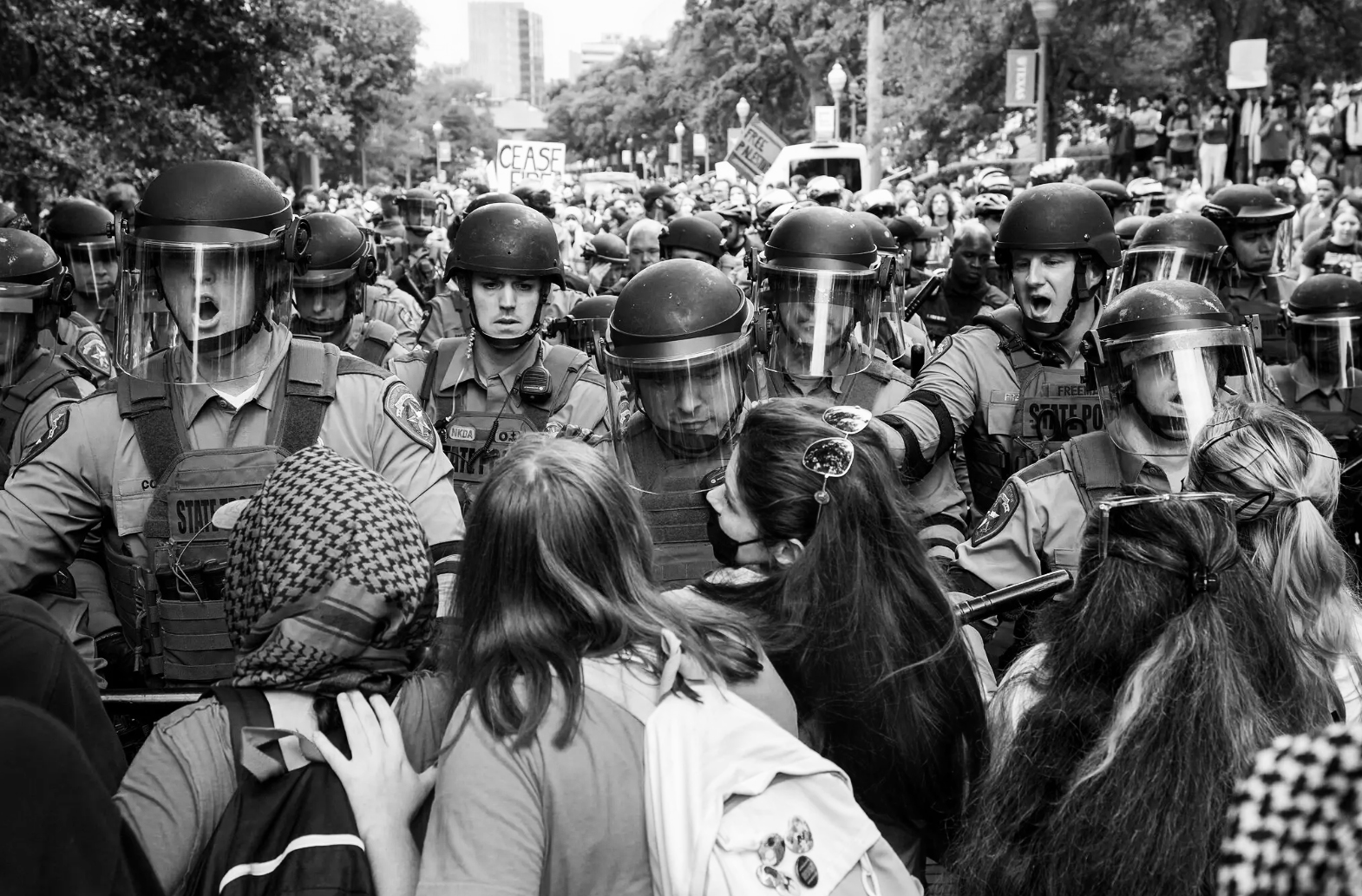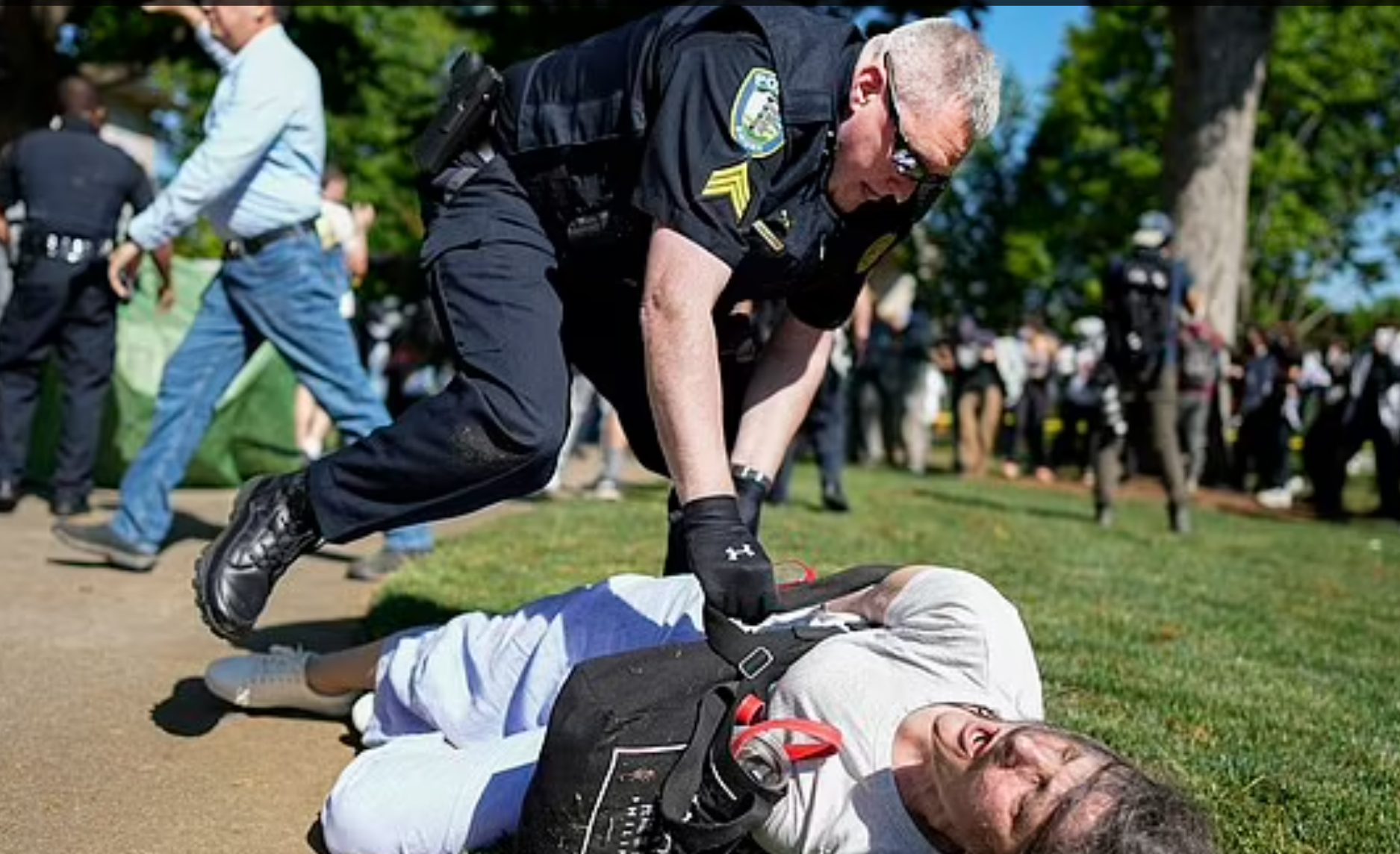Campus Protests about Israel and the Palestinians (several updates)
This post is for discussion of the ongoing campus protests against Israel’s response to the October 7th, 2023 attack on it by Hamas, and in support of the Palestinians.
More than 34,000 Palestinians have been killed by Israel in its attack on Gaza, with two-thirds of the dead being women and children, according to the local health ministry, reports the Associated Press.

[original photo by Jay Janner/USA Today Network, via Reuters]
A round-up of recent news about protests at various college campuses can be found here.
Of particular interest are questions about how universities should (or should not) respond to these kinds of protests, and the principles, ideals, and practical considerations that underpin answers to those questions.
Details about what’s happening at your campus are welcome, as are links to news and commentary elsewhere, including links to particularly valuable social media feeds.
By way of background on the matter of free speech and campus protests, I recommend this piece by Jacob Levy (McGill). Some excerpts:
[U]niversities offer very robust protection for political and protest speech, but as an incidental byproduct, not in the same deliberate way that a liberal democratic society does. A university’s core commitment is to the discovery, transmission and preservation of knowledge – paradigmatically, what is done in research, in teaching, and in publication and library collection. The principle that defends that commitment is not freedom of speech as such, but rather academic freedom.
Academic freedom has a few moving parts:
First, the freedom to follow arguments and evidence where they lead, according to scholarly methods…
Second, the freedom to teach, within the confines of the scholarly mission of the class, and limited by the freedom of students to be secure that they will be assessed fairly…
And finally, freedom from evaluation on non-academic grounds, of which the traditionally most important are political and religious grounds. Members of the academic community are only to be academically evaluated, for purposes ranging from student grades to professors’ tenure, on the grounds of the success of their academic work. They may not lose academic standing (student enrolment, faculty employment and so on) for their views and speech on other questions. In the early 20th-century cases that helped shape this rule, universities came to the understanding that, say, an economist couldn’t be fired for being an atheist, a mathematician for being a socialist; what they had to say on those political and religious questions was irrelevant to their work. The technical phrase here is freedom of extramural speech – outside the walls of the laboratory, the classroom and the library. Protections of extramural speech are very strong, not primarily in order to protect that speech, but in order to protect the academic integrity of what goes on inside the laboratory, classroom and library.
A rule that has traditionally accompanied and strengthened academic freedom is institutional neutrality. If academic freedom is the ability of scholars and scholarly communities or disciplines to work without having an orthodoxy imposed on them, institutional neutrality is the commitment not to declare an orthodoxy in the first place. Just like a professor at the front of a classroom shouldn’t use it as a pulpit to announce their own political and religious views, so too should the university as a whole not adopt substantive political or religious opinions that would chill the freedom of its members to pursue their own ideas and arguments. A great deal of important political inquiry and debate happens at a university, but it’s undertaken by students and professors with differing views pursuing differing arguments, not by the institution as a whole declaring official conclusions…
These principles generate some surprising and strange outcomes. For example, the odd thing about the centrality of student protests to important moments in university life is that they are so irrelevant to the university’s mission. There is very strong protection for the freedom of protest, not because protest is important to a university the way it is to a democratic society, but because it’s academically irrelevant. It’s wrong to question a student’s (or professor’s) standing in the academic community because of what they say at a protest – or on social media, or in any other non-academic setting. The only appropriate limits are not about the content of what’s said, but about the conduct of the protest action; the university has to protect not only the safety of its other members but also the security of its academic functions. It can’t rule against the language on a sign, but it must intervene to prevent violence between students, or occupations and blockades that would prevent a class from meeting, or an invited speaker from speaking.
This is easier said than done…
I recommend reading the whole piece.
One thing to note is that the institutional neutrality Levy discusses is especially tricky, particularly in this context: one declared aim of some of the student groups is to get their universities to stop investing in companies involved in or profiting from Israel’s military efforts in Gaza. Should such investments themselves be considered a deviation from institutional neutrality, such that the student calls for divestment could be seen as a call for institutional neutrality? Or are such investments in principle relevantly different from what we might think of as paradigmatic departures from institutional neutrality, such as an official statement supporting a side in a political dispute? The details probably matter here, both on the extent to which investment in certain companies is intentional, and the extent to which such companies are “involved” with Israel’s war efforts.
And that’s just one issue.
OK, let’s see how this goes. (Comments are moderated. Please remind yourselves of the comments policy. Thanks.)
UPDATE 1 (4/25/24): The Department of Philosophy at Columbia University has issued the following statement:
The Philosophy Department is concerned for the safety, academic progress, and rights of our students. We condemn all forms of hate speech, harassment, and incitements to violence. We also regard it as quite implausible that erecting a tent on a lawn constitutes a clear and present danger, and we urge the lifting of suspensions of students whose charges stem from that act. Thus we support the joint statement by the Columbia and Barnard Chapters of the American Association of University Professors and the letter from the Columbia College Student Council. We want President Shafik to succeed, and for mutual trust between all parties on campus to be regained. Such success and trust requires visible engagement by the President and Trustees with the procedures of faculty governance.
UPDATE 2 (4/25/24): Noelle McAfee, professor and chair of philosophy at Emory University, was among those arrested for protesting at Emory.
WATCH: Among those arrested today were Noelle McAfee, Chair of the Philosophy Department at Emory University.
I’ve asked for a comment from Emory on this arrest, no word yet.
This video provided to us by an #Emory PHD student. You can hear him in this video. @ATLNewsFirst pic.twitter.com/86aJgb7NUX
— Patrick Quinn (@PatrickQuinnTV) April 25, 2024
Thanks to several readers for bringing this to my attention. Original Tweet here.
UPDATE 3 (4/26/24): Sukaina Hirji, assistant professor of philosophy at the University of Pennsylvania, gave a speech to protestors there. Watch it here.
UPDATE 4 (4/26/24): Caroline Fohlin, professor of economics at Emory University, asks three law enforcement officers who appear to be on top of a student protestor on the ground, “what are you doing?” A fourth officer grabs her, pulls her away, twists her arm behind her back, and pushes her to the ground. A second officer joins in pushing her down, heedless of the fact her head is being pushed into the sidewalk.
FULL VIDEO OF ELDERLY AMERICAN ECONOMICS PROFESSOR CAROLINE FOHLIN BEING ASSAULTED BY POLICE
She is an over 65 year old American woman.
Americans attacked for Israel.
What if this was your mother/grandmother? pic.twitter.com/ne7uDsPGIX
— Sulaiman Ahmed (@ShaykhSulaiman) April 26, 2024
According to news reports, she was charged with disorderly conduct and battery of a police officer. This guy:

The post Campus Protests about Israel and the Palestinians (several updates) first appeared on Daily Nous.